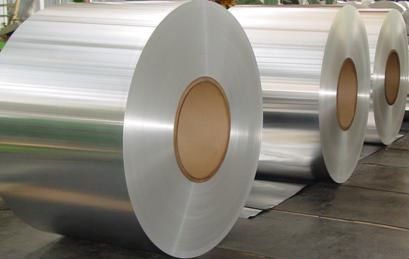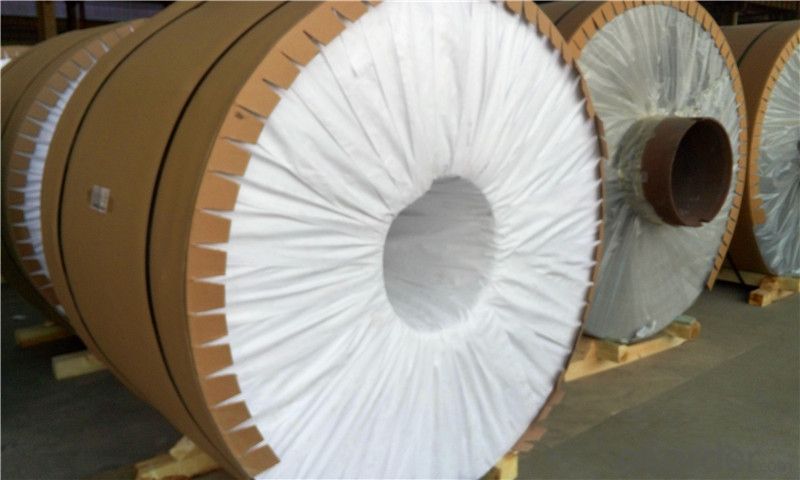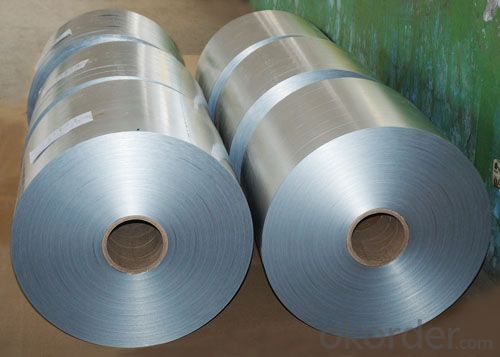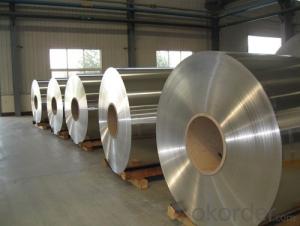1100 1050 1060 1235 Pure Aluminum Coil for PP Cap
- Loading Port:
- Shanghai
- Payment Terms:
- TT OR LC
- Min Order Qty:
- 5 m.t.
- Supply Capability:
- 5000 m.t./month
OKorder Service Pledge
Quality Product, Order Online Tracking, Timely Delivery
OKorder Financial Service
Credit Rating, Credit Services, Credit Purchasing
You Might Also Like
Item specifice
Grade:
1000 Series,3000 Series,5000 Series
Surface Treatment:
Brushed,Enameled Wire,Color Coated,Mill Finish,Embossed,Coated
Shape:
Rectangular,Flat,T-Profile,Angle
Temper:
T3-T8,Half Hard,Soft,T351-T851
Application:
Pharmaceutical,Transportation Tools,Decorations,Kitchen Use
Technique:
DC/CC
Thickness:
0.05-4.0mm
Width:
200mm---980mm
Outer Diameter:
450-600
Net Weight (kg):
2.5 ton
Packaging:
Wooden pallets
1100 1050 1060 1235 Pure Aluminum Coil for PP Cap
Packaging & Delivery
Product Specification | |
Grade | 1000 Series: 1050 1060 1100 3000 Series: 3003 3004 3105 5000 Series: 5052 5605,5083 6000 Series: 6061 6063 8000 Series: 8011 8021 8079 |
Thickness | 0.20-8.00mm |
Width | 2400mm max. |
Grade | 1000,3000,5000,6000,8000series |
Coil ID | 75mm, 150mm, 200mm, 300mm, 400mm, 508mm or negotiable |
Coil weight | 1000-5000kgs |
Coil OD | 1700mm max. |
Temper | O, H12, H14, H16, H111, H22 ,H24, H26, H28,T4, T6,etc. |
| Temper | |
| F | processing state |
| H | strain hardening state |
| O | annealing |
| T | heat treatment state |
| H112 | pure state of strain hardening, adjustment has been made to degree of strain hardening and annealing |
| T4 | solid solution treatment and natural efficiency to achieve sufficient stability condition |
| T5 | artificial aging condition of the reentry after high temperature thermal cooling |
| T6 | artificial aging state after solid solution treatment |
Chemical Composition | |||||||||
| Grade | Si | Fe | Cu | Mn | Mg | Cr | Ni | Zn | Al |
| 1050 | 0.25 | 0.4 | 0.05 | 0.05 | 0.05 | - | - | 0.05 | 99.5 |
| 1060 | 0.25 | 0.35 | 0.05 | 0.03 | 0.03 | - | - | 0.05 | 99.6 |
| 1070 | 0.2 | 0.25 | 0.04 | 0.03 | 0.03 | - | - | 0.04 | 99.7 |
| 1100 | Si+Fe:0.95 | 0.05-0.2 | 0.05 | - | - | 0.1 | - | 99 | |
| 1200 | Si+Fe:1.00 | 0.05 | 0.05 | - | - | 0.1 | 0.05 | 99 | |
| 1235 | Si+Fe:0.65 | 0.05 | 0.05 | 0.05 | - | 0.1 | 0.06 | 99.35 | |
| 3003 | 0.6 | 0.7 | 0.05-0.2 | 1.0-1.5 | - | - | - | 0.1 | remains |
| 3004 | 0.3 | 0.7 | 0.25 | 1.0-1.5 | 0.8-1.3 | - | - | 0.25 | remains |
| 3005 | 0.6 | 0.7 | 0.25 | 1.0-1.5 | 0.20-0.6 | 0.1 | - | 0.25 | remains |
| 3105 | 0.6 | 0.7 | 0.3 | 0.30-0.8 | 0.20-0.8 | 0.2 | - | 0.4 | remains |
| 3A21 | 0.6 | 0.7 | 0.2 | 1.0-1.6 | 0.05 | - | - | 0.1 | remains |
| 5005 | 0.3 | 0.7 | 0.2 | 0.2 | 0.50-1.1 | 0.1 | - | 0.25 | remains |
| 5052 | 0.25 | 0.4 | 0.1 | 0.1 | 2.2-2.8 | 0.15-0.35 | - | 0.1 | remains |
| 5083 | 0.4 | 0.4 | 0.1 | 0.40-1.0 | 4.0-4.9 | 0.05-0.25 | - | 0.25 | remains |
| 5154 | 0.25 | 0.4 | 0.1 | 0.1 | 3.1-3.9 | 0.15-0.35 | - | 0.2 | remains |
| 5182 | 0.2 | 0.35 | 0.15 | 0.20-0.50 | 4.0-5.0 | 0.1 | - | 0.25 | remains |
| 5251 | 0.4 | 0.5 | 0.15 | 0.1-0.5 | 1.7-2.4 | 0.15 | - | 0.15 | remains |
| 5754 | 0.4 | 0.4 | 0.1 | 0.5 | 2.6-3.6 | 0.3 | - | 0.2 | remains |
| 6061 | 0.40-0.8 | 0.7 | 0.15-0.40 | 0.15 | 0.8-1.2 | 0.04-0.35 | - | 0.25 | remains |
| 6063 | 0.20-0.6 | 0.35 | 0.1 | 0.1 | 0.45-0.9 | 0.1 | - | 0.1 | remains |
| 6082 | 0.7-1.3 | 0.5 | 0.1 | 0.40-1.0 | 0.6-1.2 | 0.25 | - | 0.2 | remains |
| 6A02 | 0.50-1.2 | 0.5 | 0.20-0.6 | Or Cr0.15-0.35 | 0.45-0.9 | - | - | 0.2 | remains |
| 8011 | 0.50-0.9 | 0.6-1.0 | 0.1 | 0.2 | 0.05 | 0.05 | - | 0.1 | remains |



- Q:I think the use of aluminum, at the lower levels, has really hurt US born players. To give a kid a piece of metal, and expect him to use wood when drafted........ I think US should go back to wood, whatever the costs (I know the aluminum is far cheaper). Thoughts....Cheers.
- Maybe. Remember, there are still tons of American born players who are some of the top players in the league. Mark Teixeira, David Wright, Ryan Braun, and many others. Also, while the use of aluminum bats may hurt American position players, pitching is completely dominated by Americans. Tim Lincecum, CC Sabathia, Cole Hamels, Ryan Dempster, Jake Peavy, Scott Kazmir. The problem is that like you said aluminum is cheaper and players are used to them. Also with aluminum bats you can have bats as light as 18 ounces and as heavy as 30 or more ounces, so kids can start using aluminum bats from an early age and not want to switch to wood. I think what they should at least do is take aluminum bats out of college baseball.
- Q:What are some common applications for aluminum coils?
- Aluminum coils are widely used in various industries due to their exceptional qualities and versatility. Some common applications for aluminum coils include: 1. Construction: Aluminum coils are extensively used in the construction industry for roofing, cladding, and insulation purposes. The lightweight nature of aluminum makes it an ideal material for these applications, as it reduces the overall weight of the structure and provides excellent resistance to corrosion. 2. Transportation: Aluminum coils are widely used in the automotive and aerospace industries. In the automotive sector, aluminum coils are used in the manufacturing of heat exchangers, radiators, and condensers. They are also used to produce lightweight body panels, reducing the overall weight of vehicles and improving fuel efficiency. In the aerospace industry, aluminum coils are used to manufacture aircraft parts, including wings, fuselages, and engine components, due to their high strength-to-weight ratio. 3. Electrical and Electronics: Aluminum coils are utilized in the electrical and electronics industry for various applications. They are commonly used in the production of transformers, motors, and generators, as aluminum has excellent conductivity and is lightweight. Aluminum coils are also used in the manufacturing of electrical cables, as they provide good electrical conductivity and are resistant to corrosion. 4. Packaging: Aluminum coils are extensively used in the packaging industry due to their excellent barrier properties. They are commonly used for packaging food and beverages, pharmaceuticals, and various other consumer products. Aluminum coils provide an impermeable barrier against moisture, oxygen, and light, ensuring the preservation and protection of the packaged goods. 5. Heating, Ventilation, and Air Conditioning (HVAC): Aluminum coils are widely used in HVAC systems for their excellent heat transfer properties. They are commonly found in air conditioning systems, heat pumps, and refrigeration units. Aluminum coils provide efficient heat exchange, ensuring effective cooling and heating processes. In summary, aluminum coils find common applications in construction, transportation, electrical and electronics, packaging, and HVAC industries due to their lightweight nature, corrosion resistance, excellent conductivity, and heat transfer properties.
- Q:Can aluminum coils be used for nameplates and labels?
- Indeed, nameplates and labels can utilize aluminum coils. Aluminum, being a versatile material, presents numerous benefits in this regard. Notably, its lightweight nature coupled with its durability renders it suitable for diverse applications. Furthermore, aluminum boasts exceptional resistance to corrosion, making it an excellent choice for outdoor usage or environments with high humidity levels. Moreover, aluminum lends itself easily to stamping, embossing, or engraving, thereby facilitating the creation of intricate designs and detailed text. Additionally, it is feasible to apply coatings or anodize aluminum coils to augment their visual appeal or provide added protection. All in all, aluminum coils offer a dependable and cost-efficient solution for nameplates and labels.
- Q:I am sanding tool marks out of aluminum rims and plan on polishing them. Any help to make sanding them easier would be welcome.
- Eastwood okorder /
- Q:What is the difference between hot-rolled and cold-rolled aluminum coils?
- The main difference between hot-rolled and cold-rolled aluminum coils lies in the manufacturing process and the resulting properties of the finished product. Hot-rolled aluminum coils are produced by heating aluminum ingots at high temperatures and then passing them through rollers to achieve the desired thickness and shape. This process makes the aluminum more malleable and allows for greater flexibility in terms of shape and size. Hot-rolled coils are typically larger in size and have a rougher surface finish compared to cold-rolled coils. On the other hand, cold-rolled aluminum coils are manufactured by cooling down the hot-rolled coils and then passing them through rollers at room temperature. This process not only reduces the thickness of the aluminum but also improves its surface finish, making it smoother and more aesthetically pleasing. Cold-rolled coils are typically thinner and have a more consistent thickness compared to hot-rolled coils. The differences in the manufacturing process and surface finish of these two types of coils result in different mechanical properties. Hot-rolled aluminum coils are generally less strong and have lower tensile strength compared to cold-rolled coils. However, hot-rolled coils are more ductile and can be easily formed and shaped without cracking. On the other hand, cold-rolled coils have higher tensile strength and are more suitable for applications requiring greater strength and durability. In summary, hot-rolled aluminum coils are larger, have a rougher surface finish, and are more malleable, while cold-rolled aluminum coils are thinner, have a smoother surface finish, and are stronger. The choice between hot-rolled and cold-rolled coils depends on the specific requirements of the application, such as strength, surface finish, and formability.
- Q:What is the weight of aluminum coils per square foot?
- The weight per square foot of aluminum coils may differ based on the coil's thickness. Typically, aluminum coils have an average weight of approximately 0.5 pounds per square foot. Nevertheless, it is crucial to mention that this value is an approximation and might slightly fluctuate depending on the particular alloy and manufacturing procedure applied. It is always advisable to consult the manufacturer or supplier to obtain precise weight specifications for the aluminum coils you are dealing with.
- Q:What is the thickness tolerance of aluminum coils?
- The thickness tolerance of aluminum coils varies depending on the grade and manufacturing process. Typically, aluminum coils have a standard thickness tolerance of approximately +/- 0.005 inches (+/- 0.13 mm). However, it is important to note that this tolerance can be further adjusted or refined based on the specific requirements of the customer and the capabilities of the manufacturer. Certain specialized aluminum coil manufacturers may offer even tighter thickness tolerances, usually around +/- 0.002 inches (+/- 0.05 mm), to cater to more precise or demanding applications. To ensure the desired thickness tolerance is met for a specific project or application, it is always recommended to consult with the manufacturer or supplier.
- Q:Can aluminum coils be used in the manufacturing of beverage cans?
- Yes, aluminum coils can be used in the manufacturing of beverage cans. Aluminum coils are commonly used in the production of beverage cans due to their lightweight, corrosion-resistant, and malleable properties. These coils are processed and shaped into cans during the manufacturing process, providing a durable and cost-effective solution for packaging beverages.
- Q:who invented aluminum and or aluminum foil?
- placed extremely oil or butter on a paper napkin or paper towel and rub on the pan. do not forget the ends, it truly is the position pies especially stick. No, it truly is not had to oil an aluminum pan, in spite of the undeniable fact that the perimeters do look to adhere.
- Q:How do aluminum coils contribute to noise isolation?
- Aluminum coils can contribute to noise isolation in several ways. Firstly, the use of aluminum as a material for coils provides excellent thermal and electrical conductivity, which helps to dissipate heat and electromagnetic interference. This reduces the chances of noise generated by these factors. Additionally, aluminum coils can be designed with specific properties that enhance noise isolation. By using thicker aluminum wire, the coil can have a higher resistance, reducing the transmission of electrical noise. Furthermore, the shape and size of the coil can be optimized to minimize vibrations and resonance, which are common sources of noise. Furthermore, aluminum coils can be used in conjunction with other noise isolating materials. For example, they can be combined with acoustic foam or other sound-absorbing materials, creating a barrier that prevents sound transmission. The aluminum coil acts as a structural support while the additional materials absorb and dampen sound waves, further enhancing noise isolation. Overall, aluminum coils contribute to noise isolation by dissipating heat and electromagnetic interference, minimizing vibrations and resonance, and providing a structural support for other noise isolating materials.
1. Manufacturer Overview |
|
|---|---|
| Location | |
| Year Established | |
| Annual Output Value | |
| Main Markets | |
| Company Certifications | |
2. Manufacturer Certificates |
|
|---|---|
| a) Certification Name | |
| Range | |
| Reference | |
| Validity Period | |
3. Manufacturer Capability |
|
|---|---|
| a)Trade Capacity | |
| Nearest Port | |
| Export Percentage | |
| No.of Employees in Trade Department | |
| Language Spoken: | |
| b)Factory Information | |
| Factory Size: | |
| No. of Production Lines | |
| Contract Manufacturing | |
| Product Price Range | |
Send your message to us
1100 1050 1060 1235 Pure Aluminum Coil for PP Cap
- Loading Port:
- Shanghai
- Payment Terms:
- TT OR LC
- Min Order Qty:
- 5 m.t.
- Supply Capability:
- 5000 m.t./month
OKorder Service Pledge
Quality Product, Order Online Tracking, Timely Delivery
OKorder Financial Service
Credit Rating, Credit Services, Credit Purchasing
Similar products
New products
Hot products
Related keywords




























